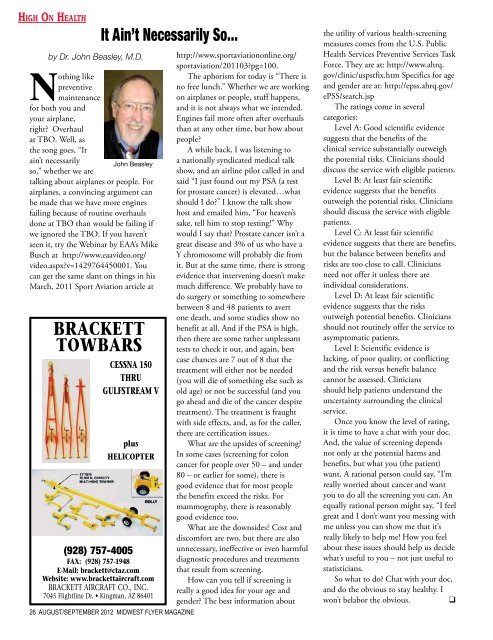Midwest Flyer Magazine
Midwest Flyer Magazine
Midwest Flyer Magazine
- No tags were found...
Create successful ePaper yourself
Turn your PDF publications into a flip-book with our unique Google optimized e-Paper software.
HIGH ON HEALTHby Dr. John Beasley, M.D.Nothing likepreventivemaintenancefor both you andyour airplane,right? Overhaulat TBO. Well, asthe song goes, “Itain’t necessarilyJohn Beasleyso,” whether we aretalking about airplanes or people. Forairplanes, a convincing argument canbe made that we have more enginesfailing because of routine overhaulsdone at TBO than would be failing ifwe ignored the TBO. If you haven’tseen it, try the Webinar by EAA’s MikeBusch at http://www.eaavideo.org/video.aspx?v=1429764450001. Youcan get the same slant on things in hisMarch, 2011 Sport Aviation article atBRACKETTTOWBARSCESSNA 150THRUGULFSTREAM VplusHELICOPTER(928) 757-4005FAX: (928) 757-1948E-Mail: brackett@ctaz.comWebsite: www.brackettaircraft.comBRACKETT AIRCRAFT CO., INC.7045 Flightline Dr. • Kingman, AZ 86401It Ain’t Necessarily So....9""#$%$&'(&)*')+,)-"./0.""+123)&'"456)-"+#%#718)"""http://www.sportaviationonline.org/sportaviation/201103?pg=100.The aphorism for today is “There isno free lunch.” Whether we are workingon airplanes or people, stuff happens,and it is not always what we intended.Engines fail more often after overhaulsthan at any other time, but how aboutpeople?A while back, I was listening toa nationally syndicated medical talkshow, and an airline pilot called in andsaid “I just found out my PSA (a testfor prostate cancer) is elevated…whatshould I do?# I know the talk showhost and emailed him, “For heaven’ssake, tell him to stop testing!” Whywould I say that? Prostate cancer isn’t agreat disease and 3% of us who have aY chromosome will probably die fromit. But at the same time, there is strongevidence that intervening doesn’t makemuch difference. We probably have todo surgery or something to somewherebetween 8 and 48 patients to avertone death, and some studies show nobenefit at all. And if the PSA is high,then there are some rather unpleasanttests to check it out, and again, bestcase chances are 7 out of 8 that thetreatment will either not be needed(you will die of something else such asold age) or not be successful (and yougo ahead and die of the cancer despitetreatment). The treatment is fraughtwith side effects, and, as for the caller,there are certification issues.What are the upsides of screening?In some cases (screening for coloncancer for people over 50 – and under80 – or earlier for some), there isgood evidence that for most peoplethe benefits exceed the risks. Formammography, there is reasonablygood evidence too.What are the downsides? Cost anddiscomfort are two, but there are alsounnecessary, ineffective or even harmfuldiagnostic procedures and treatmentsthat result from screening.How can you tell if screening isreally a good idea for your age andgender? The best information aboutthe utility of various health-screeningmeasures comes from the U.S. PublicHealth Services Preventive Services TaskForce. They are at: http://www.ahrq.gov/clinic/uspstfix.htm Specifics for ageand gender are at: http://epss.ahrq.gov/ePSS/search.jspThe ratings come in severalcategories:Level A: Good scientific evidencesuggests that the benefits of theclinical service substantially outweighthe potential risks. Clinicians shoulddiscuss the service with eligible patients.Level B: At least fair scientificevidence suggests that the benefitsoutweigh the potential risks. Cliniciansshould discuss the service with eligiblepatients.Level C: At least fair scientificevidence suggests that there are benefits,but the balance between benefits andrisks are too close to call. Cliniciansneed not offer it unless there areindividual considerations.Level D: At least fair scientificevidence suggests that the risksoutweigh potential benefits. Cliniciansshould not routinely offer the service toasymptomatic patients.Level I: Scientific evidence islacking, of poor quality, or conflictingand the risk versus benefit balancecannot be assessed. Cliniciansshould help patients understand theuncertainty surrounding the clinicalservice.Once you know the level of rating,it is time to have a chat with your doc.And, the value of screening dependsnot only at the potential harms andbenefits, but what you (the patient)want. A rational person could say, “I’mreally worried about cancer and wantyou to do all the screening you can. Anequally rational person might say, “I feelgreat and I don’t want you messing withme unless you can show me that it’sreally likely to help me! How you feelabout these issues should help us decidewhat’s useful to you – not just useful tostatisticians.So what to do? Chat with your doc,and do the obvious to stay healthy. Iwon’t belabor the obvious.
















